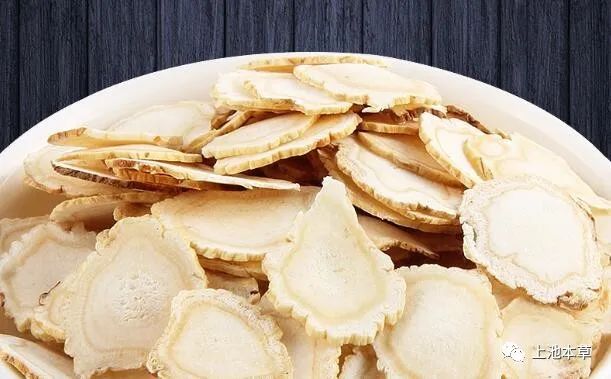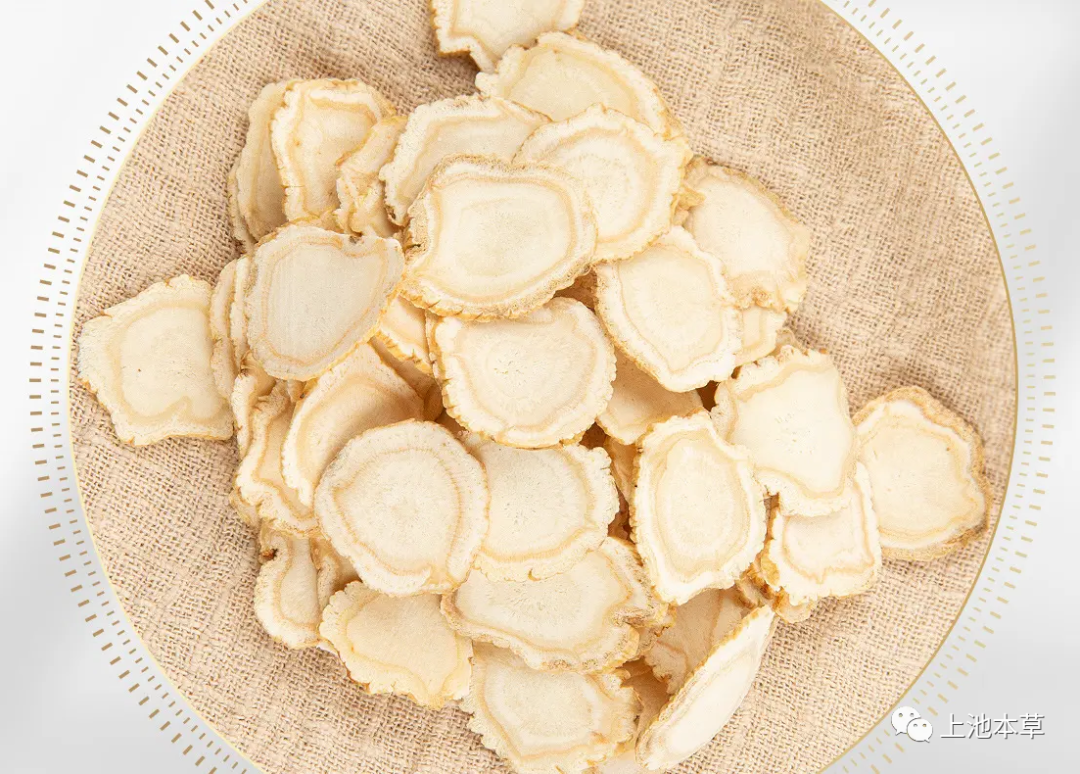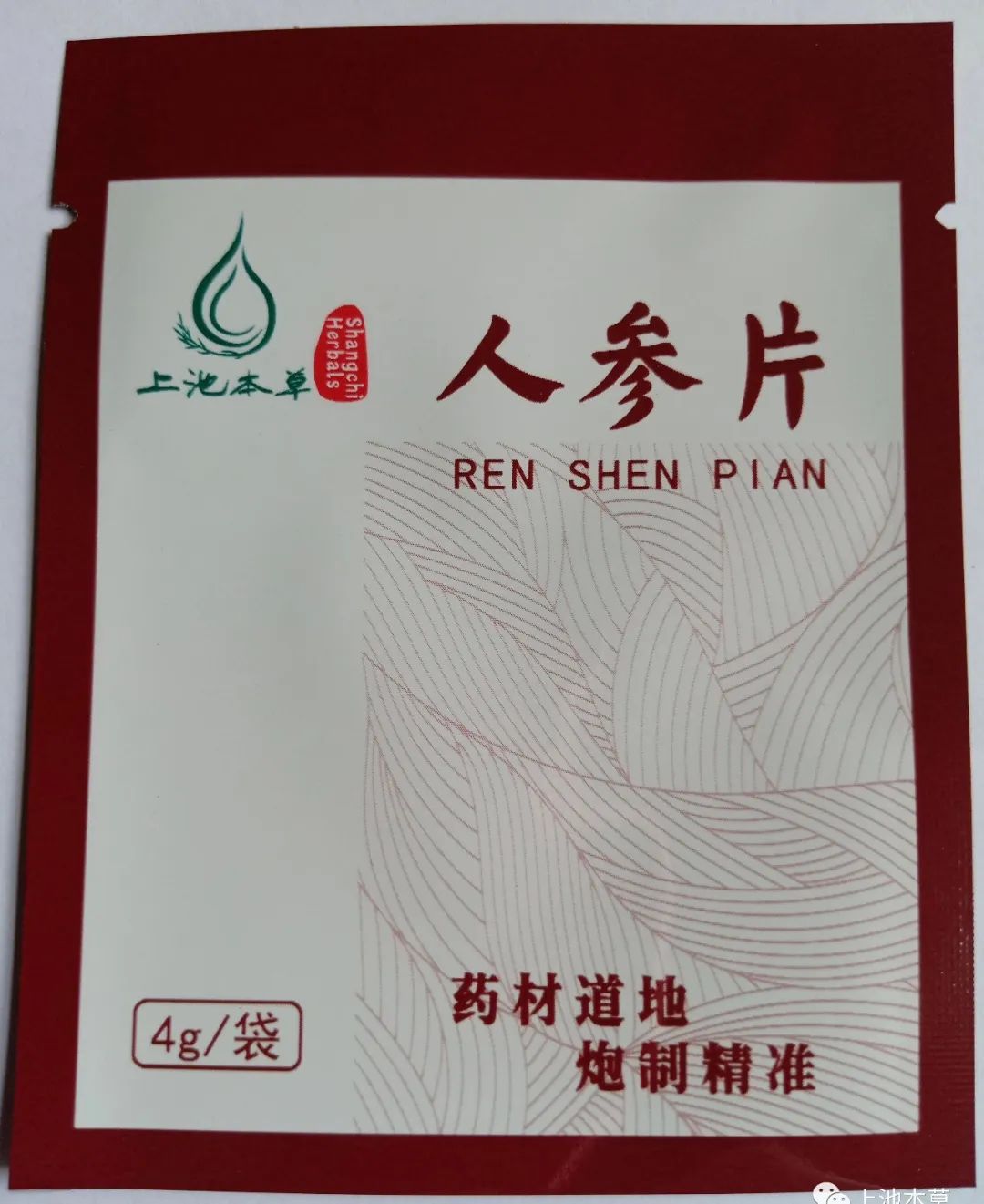Introduction to the Herb
1
 Ginseng slices are made from the dried roots and rhizomes of the plant Panax ginseng (人参, rén shēn). Ginseng has a sweet flavor and is known for its ability to greatly replenish vital energy (元气, yuán qì). For many medical practitioners, ginseng is often the first herbal remedy they encounter. Historical records extensively describe the tonic effects of ginseng: it can be used to replenish energy in cases of weakness and shortness of breath; to calm the mind in cases of palpitations and forgetfulness; and to nourish the spirit in cases of fatigue and weakness. It is also indicated for symptoms such as heart deficiency, anxiety, and forgetfulness when reading or reciting poetry. Even for internal eye disorders leading to dim vision, ginseng can be beneficial. Furthermore, numerous classic TCM formulas incorporate ginseng, especially those aimed at enhancing organ function, making ginseng almost indispensable. Ginseng strengthens the spleen and boosts energy, treating spleen deficiency and fatigue; it is often combined with Bai Zhu (白术, bái zhú), Fu Ling (茯苓, fú líng), and Gan Cao (甘草, gān cǎo) in the Si Jun Zi Tang (四君子汤, Four Gentlemen Decoction). Ginseng nourishes the lungs and benefits the kidneys, treating deficiency-related cough and asthma, often paired with Ge Jie (蛤蚧, gé jiè) in the Ren Shen Ge Jie San (人参蛤蚧散, Ginseng and Gecko Powder). Ginseng also nourishes the heart and aids sleep, beneficial for those who feel fatigued and struggle to fall asleep; it can be taken alone or combined with Suan Zao Ren (酸枣仁, suān zǎo rén), Huang Qi (黄芪, huáng qí), Dan Shen (丹参, dān shēn), and Fu Ling (茯苓, fú líng). The well-known formula Zhi Gan Cao Tang (炙甘草汤, Honey-Fried Licorice Decoction), also known as Fu Mai Tang (复脉汤, Revive Pulse Decoction), benefits qi and nourishes yin, indicated for conditions of yin and blood deficiency, weak yang qi, and heart palpitations, often using ginseng with Zhi Gan Cao (炙甘草, zhì gān cǎo) and Ejiao (阿胶, ā jiāo). Ginseng greatly replenishes vital energy, treating deficiency, fatigue, cold intolerance, and is often combined with Huang Qi (黄芪, huáng qí), Gan Cao (甘草, gān cǎo), and Rou Gui (肉桂, ròu guì) in the Bao Yuan Tang (保元汤, Preserve the Source Decoction).
Ginseng slices are made from the dried roots and rhizomes of the plant Panax ginseng (人参, rén shēn). Ginseng has a sweet flavor and is known for its ability to greatly replenish vital energy (元气, yuán qì). For many medical practitioners, ginseng is often the first herbal remedy they encounter. Historical records extensively describe the tonic effects of ginseng: it can be used to replenish energy in cases of weakness and shortness of breath; to calm the mind in cases of palpitations and forgetfulness; and to nourish the spirit in cases of fatigue and weakness. It is also indicated for symptoms such as heart deficiency, anxiety, and forgetfulness when reading or reciting poetry. Even for internal eye disorders leading to dim vision, ginseng can be beneficial. Furthermore, numerous classic TCM formulas incorporate ginseng, especially those aimed at enhancing organ function, making ginseng almost indispensable. Ginseng strengthens the spleen and boosts energy, treating spleen deficiency and fatigue; it is often combined with Bai Zhu (白术, bái zhú), Fu Ling (茯苓, fú líng), and Gan Cao (甘草, gān cǎo) in the Si Jun Zi Tang (四君子汤, Four Gentlemen Decoction). Ginseng nourishes the lungs and benefits the kidneys, treating deficiency-related cough and asthma, often paired with Ge Jie (蛤蚧, gé jiè) in the Ren Shen Ge Jie San (人参蛤蚧散, Ginseng and Gecko Powder). Ginseng also nourishes the heart and aids sleep, beneficial for those who feel fatigued and struggle to fall asleep; it can be taken alone or combined with Suan Zao Ren (酸枣仁, suān zǎo rén), Huang Qi (黄芪, huáng qí), Dan Shen (丹参, dān shēn), and Fu Ling (茯苓, fú líng). The well-known formula Zhi Gan Cao Tang (炙甘草汤, Honey-Fried Licorice Decoction), also known as Fu Mai Tang (复脉汤, Revive Pulse Decoction), benefits qi and nourishes yin, indicated for conditions of yin and blood deficiency, weak yang qi, and heart palpitations, often using ginseng with Zhi Gan Cao (炙甘草, zhì gān cǎo) and Ejiao (阿胶, ā jiāo). Ginseng greatly replenishes vital energy, treating deficiency, fatigue, cold intolerance, and is often combined with Huang Qi (黄芪, huáng qí), Gan Cao (甘草, gān cǎo), and Rou Gui (肉桂, ròu guì) in the Bao Yuan Tang (保元汤, Preserve the Source Decoction).
Dietary Recommendations
2
 In ancient times, high-quality ginseng was a prestigious gift from emperors to royal family members. Fortunately, with improved living conditions and a growing awareness of health maintenance, many are willing to invest in ginseng for health benefits. Below are some recommended methods for consuming ginseng.1. Powder and Tablets: Slicing ginseng into thin pieces or grinding it into powder makes it easy to store and consume. When eating, place the tablet in the mouth, swallow the ginseng juice, and chew the remaining piece before swallowing, or dissolve the powder in warm water. Slicing for oral consumption can stimulate saliva and is suitable for health-conscious individuals;2. Stewing: Stewing ginseng is simple and convenient. Cut ginseng into slices or chunks, add water, and simmer. Drinking the ginseng broth ensures that the nutrients are preserved, and stewed ginseng is easier to absorb compared to raw slices, with the added benefit of sterilization;
In ancient times, high-quality ginseng was a prestigious gift from emperors to royal family members. Fortunately, with improved living conditions and a growing awareness of health maintenance, many are willing to invest in ginseng for health benefits. Below are some recommended methods for consuming ginseng.1. Powder and Tablets: Slicing ginseng into thin pieces or grinding it into powder makes it easy to store and consume. When eating, place the tablet in the mouth, swallow the ginseng juice, and chew the remaining piece before swallowing, or dissolve the powder in warm water. Slicing for oral consumption can stimulate saliva and is suitable for health-conscious individuals;2. Stewing: Stewing ginseng is simple and convenient. Cut ginseng into slices or chunks, add water, and simmer. Drinking the ginseng broth ensures that the nutrients are preserved, and stewed ginseng is easier to absorb compared to raw slices, with the added benefit of sterilization;
Ginseng Recipe 1: Ginseng and Glutinous Rice Porridge
Ingredients: 100g glutinous rice, 5g ginseng, 30g rock sugar
Preparation: Finely chop the ginseng. Cook the ginseng and glutinous rice together to make porridge. Add rock sugar, stir until dissolved, and serve.
Ginseng Recipe 2: Ginseng Shark Fin Soup
Ingredients: Appropriate amount of ginseng, shark fin, rock sugar, and water
Preparation: Soak the shark fin, clean it, and tear it into pieces; place the shark fin in a slow cooker; add an appropriate amount of ginseng; pour in enough boiling water; cover the pot and cook on high until done.
3. Infused Alcohol: Clean the ginseng and place it in high-concentration liquor for more than half a month before consumption. Ginseng liquor has various benefits, including dispelling wind and cold, and promoting blood circulation. However, it is not suitable for those allergic to alcohol or with liver disease;4. Soup: Ginseng can be simmered with nutritious ingredients to create balanced soups, such as ginseng chicken soup, goji berry and ginseng soup, and pork rib and ginseng soup, which can provide calcium, minerals, vitamins, and high-quality animal protein.
Product Information
3

【Standards】 2020 Edition of the Chinese Pharmacopoeia
【Properties and Channels】 Sweet, slightly bitter, slightly warm. Enters the spleen, lung, heart, and kidney channels.
【Functions and Indications】 Greatly replenishes vital energy, restores pulse, strengthens the spleen and lung, generates fluids and nourishes blood, calms the mind and enhances intelligence. Used for symptoms of deficiency, cold limbs, weak pulse, spleen deficiency with poor appetite, lung deficiency with cough and asthma, fluid damage with thirst, internal heat with thirst, qi and blood deficiency, prolonged illness with weakness, palpitations, insomnia, impotence, and cold uterus.
【Specifications】 4g/bag
【Shelf Life】 Three years
【Dosage and Administration】 3-9g, decocted for oral use. Can also be powdered and taken, 2g at a time, twice a day.
【Caution】 Not suitable for use with Li Lu (藜芦, lí lù) or Wu Ling Zhi (五灵脂, wǔ líng zhī).
【Storage】 Store in a cool, dry place, sealed to prevent pests.

【Manufacturer】 Hebei Shangchi Herbal Medicine Co., Ltd.
【Address】 868 Dong’an Jiao Highway, Donghe Village, Anguo City, Baoding, Hebei Province
【Sales Phone】 13241025193/13910533459 Manager Chi
 【Content sourced from Kaixin Yangdao & TCM Communication Center】
【Content sourced from Kaixin Yangdao & TCM Communication Center】

